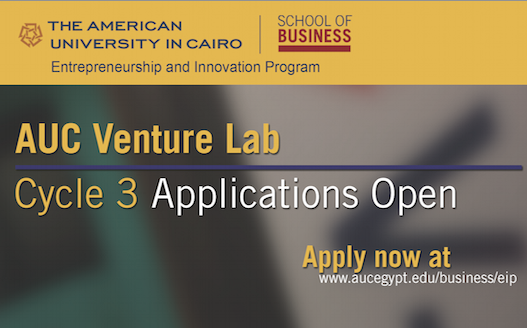Young but growing fast: AUC's V-LAB announces third cycle in a year


The American University of Cairo’s startup incubator Venture Lab, launched just a year ago, is now accepting applications for its third cycle. Buoyed by entrepreneurship’s potential to improve Egyptian socio-economic stability, the lab aims to grow quickly; it's expanding its Cycle 1 operations, in which it fostered six startups, to a new goal of serving ten startups in the round that has just been announced.
The novelty of a startup’s idea has been – and remains – key to its admission to the program. As we reported earlier this year, the criteria for applying includes having an existing product or prototype, at least one full-time founder, and a product that is “different from any other product in the Egyptian market,” said Sherif Shabana, AUC V-Lab’s manager.
The first and second class of startups represent a number of different fields, from e-commerce technology, ed-tech, design, gaming, and of course – let’s not forget this is Egypt – carpooling schemes. This sector-agnostic approach has been intentional, wrote Shabana and Dr. Ayman Ismail, the Abdul Latif Jameel Endowed Chair of Entrepreneurship at AUC’s School of Business, in a joint email to Wamda. “We are targeting innovative startups that would have a change effect in their sector to demonstrate a new success model that would help open new opportunities,” they said. “Our sector diversity will continue, with a focus on innovations in technology or business models.”
As the project begins to accept more startups to each round, incubator services will have to scale as well; at present, these include access to a network of investors, training with professional experts in marketing, sales, and project management, and assistance with their business plans, along with 20,000 EGP (~$2800 USD) in financial assistance. Shabana and Ismail are confident: “Our services do scale,” they said. With the AUC School of Business and an impressive list of mentors behind it, scaling V-LAB does indeed seem possible.
Earlier this year, Wamda contributor Eman Mostafa reported that several founders who participated in AUC V-LAB’s first cycle were disgruntled by the prize money, a relatively low amount compared with other incubators even in the region. “We would love to offer a higher award, but we are limited by resources,” responded Shabana and Ismail, referring to the same dearth of resources that hinder development all over Egypt. “The current award is provided by AUC and our V-LAB [SODIC and Arab African International Bank], and we do not take equity in exchange.”
The AUC V-LAB team’s plans don’t stop at increasing the number of startups served by their incubator. “We are also working on plans to launch a new vehicle to provide seed and first round investments for our startups. We hope that this vehicle will be ready within a year,” said Shabana and Ismail.
The incubator’s second round is currently cycling through. The seven participating startups are:
- Axology designs and produces business-specific accessories such as mobile protection cases and custom display case locks for Egypt’s high end mobile user.
- Bus Pooling is a crowd-sourced bus service allowing businesses or private users to find or create bus routes convenient to their commutes.
- DoubleVee is the first software testing firm in Egypt and is fully certified in functional, performance, operational and security testing services according to international standards.
- EduTKs is an educational toy company, whose first product, a robotic “friendly teddy toy” called Boody teaches lessons in English and Arabic.
- Madad is a crowdfunding platform for interested donors to find, support, and track the execution of causes and projects undertaken by Egyptian NGOs.
- SingleClic is a full-service digital agency specializing in creating websites, developing software, and delivering mobile customized applications for real estate and development events and conferences.
- Tatweer is a socially conscious business, whose first endeavor, Project Kiosk Uplift, seeks to redesign and revitalize Egypt’s kiosks to be more aesthetic, profitable, and supportive of social projects such as recycling.


